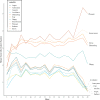The Daily Experience of Subjective Tinnitus: Ecological Momentary Assessment Versus End-of-Day Diary
- PMID: 33974776
- PMCID: PMC8694254
- DOI: 10.1097/AUD.0000000000001054
The Daily Experience of Subjective Tinnitus: Ecological Momentary Assessment Versus End-of-Day Diary
Erratum in
-
The Daily Experience of Subjective Tinnitus: Ecological Momentary Assessment Versus End-of-Day Diary: Erratum.Ear Hear. 2022 Mar/Apr;43(2):698. doi: 10.1097/AUD.0000000000001207. Ear Hear. 2022. PMID: 35213892 Free PMC article. No abstract available.
Abstract
Objective: Traditional methods of self-report assessments are susceptible to bias (i.e., memory, recall, and recency). Ecological momentary assessment (EMA) may curb these biases by repeated momentary assessment of the participant throughout the day. High costs and participant burden may, however, impede the use of EMA. End-of-day diary (EDD) provides an attractive alternative to EMA, though no direct comparison has been performed in the tinnitus field.
Design: Four thousand seven-hundred thirty-two data entries were collected from nine participants undergoing cognitive behavioral treatment for tinnitus. Eleven equivalent EMA and EDD items were collected for approximately 3 months. Tinnitus experience (i.e., anger, annoyance, avoidance, distraction, fear, invasiveness, pleasantness, and sadness) and well-being (i.e., anxiety, happiness, and stress) were correlated and means compared (t-tests).
Results: All variables presented adequate correlation (r > 0.68) between the EMA and EDD counterparts. Small (<3.9%) significant daily mean differences between EMA and EDD were found for six variables (tinnitus anger, invasiveness, pleasantness, sadness, as well as anxiety and stress) with worse results reported in EDD.
Conclusion: The small significant effects found may be attributed to the large number of data points. When EMA is not possible or recommended, EDD provides a viable alternative to assess tinnitus experience daily. Further research on the underlying mechanisms of tinnitus experience and recollection is warranted.
Copyright © 2021 The Authors. Ear & Hearing is published on behalf of the American Auditory Society, by Wolters Kluwer Health, Inc.
Conflict of interest statement
The authors have no conflicts of interest to disclose.
Figures
References
-
- Cima R. F., Maes I. H., Joore M. A., Scheyen D. J., El Refaie A., Baguley D. M., Anteunis L. J., van Breukelen G. J., Vlaeyen J. W. Specialised treatment based on cognitive behaviour therapy versus usual care for tinnitus: a randomised controlled trial. Lancet, (2012). 379, 1951–1959. - PubMed
-
- Cohen J. (Statistical Power Analysis for the Behavioral Sciences. (1988). Routledge Academic.
-
- de Beurs E., Van Dyck R., Marquenie L. A., Lange A., Blonk R. W. B. De DASS: Een vragenlijst voor het meten van depressie, angst en stress [The DASS: A questionnaire for the measurement of depression, anxiety, and stress]. Gedragstherapie, (2001). 34, 35–53.
Publication types
MeSH terms
LinkOut - more resources
Full Text Sources
Other Literature Sources
Medical
Research Materials




